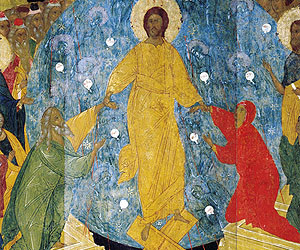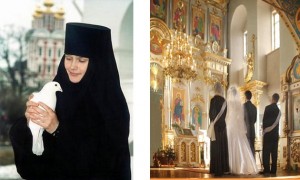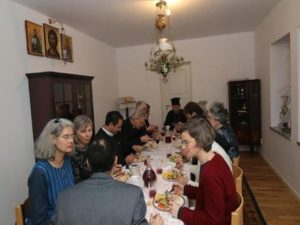The Discipline of Matrimony in the Orthodox Church
17 May 2014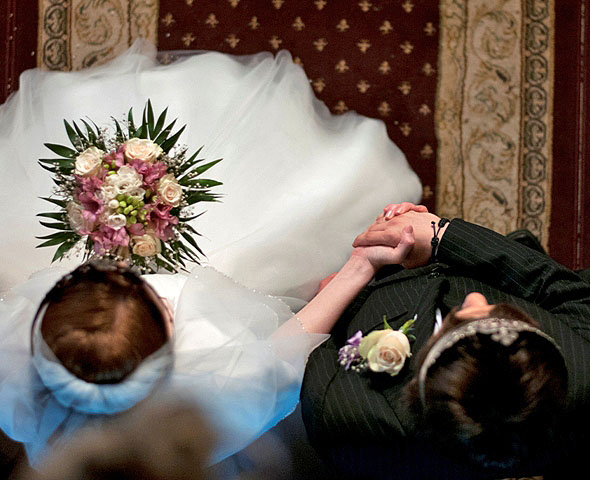
“A man shall leave his mother and father, and shall cleave to his wife, and the two shall become one flesh. So they are no longer two, but one flesh” (Matt 19:5, Eph. 5:31)
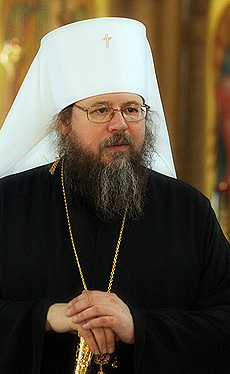 In the Orthodox Church the sacrament of Holy Matrimony is seen as an ascetic discipline. Matrimony is one of the two paths given and sanctified by the Church as a means of working out one’s salvation; the other is monasticism. Holy Matrimony is a mystical image of the union of Christ and the Church, and thus conveys the experience of being united in Christ to another person by the grace of the Holy Spirit, and thus, the life of the Kingdom of God. Grace, which is the life of God poured out on creation, is nothing other than His Love. Marriage is an ascetic discipline because it has as one of its major purposes to bring people to maturity, emotional and spiritual, by teaching mutual self-renunciation and self-denial, in order to overcome selfishness. This goal of overcoming selfishness is the foundation of spiritual life and growth, and enables the couple to live in communion with God and one another. To overcome selfishness is to be able to authentically love and be loved.
In the Orthodox Church the sacrament of Holy Matrimony is seen as an ascetic discipline. Matrimony is one of the two paths given and sanctified by the Church as a means of working out one’s salvation; the other is monasticism. Holy Matrimony is a mystical image of the union of Christ and the Church, and thus conveys the experience of being united in Christ to another person by the grace of the Holy Spirit, and thus, the life of the Kingdom of God. Grace, which is the life of God poured out on creation, is nothing other than His Love. Marriage is an ascetic discipline because it has as one of its major purposes to bring people to maturity, emotional and spiritual, by teaching mutual self-renunciation and self-denial, in order to overcome selfishness. This goal of overcoming selfishness is the foundation of spiritual life and growth, and enables the couple to live in communion with God and one another. To overcome selfishness is to be able to authentically love and be loved.
It should go without saying that the Orthodox Church does not conceive of marriage other than between a man and a woman.
Unlike Western churches, there is no sense of marriage as a contractual agreement between the couple. If there is a contractual element, it is in the Betrothal, and not seen as sacramental. First a couple is betrothed, sometimes months or years before the actual wedding, sometimes as a short service immediately before the crowning. It is, however, seen as a legal bond of marriage, and the pair are bound to chastity until the Crowning. The Crowning is the sacramental sanctification of the Marriage, and takes the relationship into the Kingdom of God, revealing it as an icon of the Church. It is blessed with crowns as an image of the mutual martyrdom to self for the sake of Christ that is required to transform the relationship between the two into a union of souls with Him. It is fulfilled by the couple receiving communion together, as man and wife.
The service of the Crowning of a Marriage is a distinct sacrament, though sometimes occurring within the Eucharistic Liturgy. From the text, it is a series of prayers for God to unite the couple to one another, citing all the marriages in the Old and New Testaments. One Protestant visitor to an Orthodox wedding said it’s like a Bible Study on marriage! God is the active party in the marriage, and the union is a union in Christ by the Holy Spirit with the Father, an image of the Kingdom, performed by the priest. The Church prays that God will grant the couple many children and all the good things of the earth in order to share with those in need; and that they may live long and peaceful lives, and see their children’s children. Truly it is a joyful thing!
Marriage is not the wedding ceremony, but the living out of the task to live in a union of love, and to grow in that love day by day, year by year. The ascetic element begins with courting, but is an essential part of the discipline of being a married Orthodox Christian for one’s whole life. Chastity is presumed, as a basic discipline of being an Orthodox Christian. The ideal is virginity until marriage. A constant theme in the marriage service is “a chaste bed.” This of course does not mean no sex in marriage, but rather, the service is to bless the couple to come together in order to bear children. This is the only context for the expression of sexual relations for Orthodox Christians. It is a spiritual discipline to break down selfishness for a couple to be open to however many children God grants them. While the use of contraceptives is tolerated within the Orthodox Church, most spiritual elders forbid their use; it is up to the couple and their father confessor. The point is to be open to children, and to multiply the love of the family.
The service blesses the couple to be fruitful and multiply, and to be blessed with all the good things of this earth. It is not, however, a blessing to be greedy, but rather to acquire sufficient wealth in order to share with those in need. The goal is always Christian charity. And as it implies a multi-generation family, echoing the Scriptures, the elders must be cared for, as well as the children, so that they can rejoice in their children’s children.
Blessed Archimandrite Sophrony of Essex wrote that the spiritual life is about extending one’s personal “I” to embrace more and more people. Thus, in marriage, a person’s “I”, his deep self, must include his wife, his children, their families in the bond of love. He or she cannot conceive of him or herself alone, but always in relation to the whole family. For a monk, this love embraces the whole brotherhood, the whole region, and the whole people of God. Of such are the saints. There is no such thing as individualism in Orthodox Christianity; the only thing done as an individual is to sin and that is what separates us from God and those around us. This corporate identity in love is the foundation of authentic personhood, always conceived in terms of relationship with others and in God. Marriage is thus far more than just a way of overcoming selfishness: it is the means for most people of attaining to authentic personhood, finding their true identity in Christ in the network of the love of their family.
Within marriage, there is one love that is exclusive: that of husband and wife. The love for the rest of the family, and beyond, is an inclusive love, which always is open to grow to include more and more people. Outside of marriage, exclusive loves are selfish. In monasticism, there can be no exclusive love; but rather it is a broadly inclusive love that embraces everyone, in a spirit of chastity. So also must be the way of life for those who are not married but in the world: to embrace and be embraced in a network of inclusive love, a context for the actualization of one’s personhood. Isolation is always seen as something negative; even the most distant hermits are not isolated, but remain within the love of the brethren.
In an Orthodox marriage, there is no “until death do us part.” As marriage is a Mystery, a breaking into this world of the Kingdom of God, the union between husband and wife is wrought by God in the Kingdom, and endures forever. It is a type of the union of Christ and the Church. Death cannot break that bond, as death has been overcome in Christ, whose love transcends the bounds of death.
The Orthodox Church is aware that not all human relationships work out; so also with marriage. The Church tolerates divorce for four canonical reasons: unfaithfulness, abuse or attempted murder, insanity and monastic vows. Other reasons are not canonically acceptable. The ideal is of course to remain married, and simply work through whatever problems arise, without giving thought to ending the marriage. This is the context for spiritual growth. First and foremost is the need for mutual forgiveness, and to be committed to the marriage no matter what. If because of the above reasons, the relationship becomes broken with no hope of reconciliation, divorce and remarriage are tolerated, as a concession to the flesh and brokenness of the human condition.
Marriage in the Orthodox Church is a natural relationship transfigured and sanctified to become a means of salvation for those engaged in it. Its crowning in church is not simply a ceremony celebrating the relationship, but filling that relationship with grace and raising it up to the Kingdom of God. Even the times of conflict and disagreement that occur within the relationship become a means of overcoming self and letting love prevail, heal and reconcile, bringing about a deeper union.
“This mystery is profound, and I am saying that it refers to Christ and the church. However, let each one of you love his wife as himself, and let the wife see that she respects her husband” (Ephesians 5:32).
***
Photo credits: Laura Trufas








